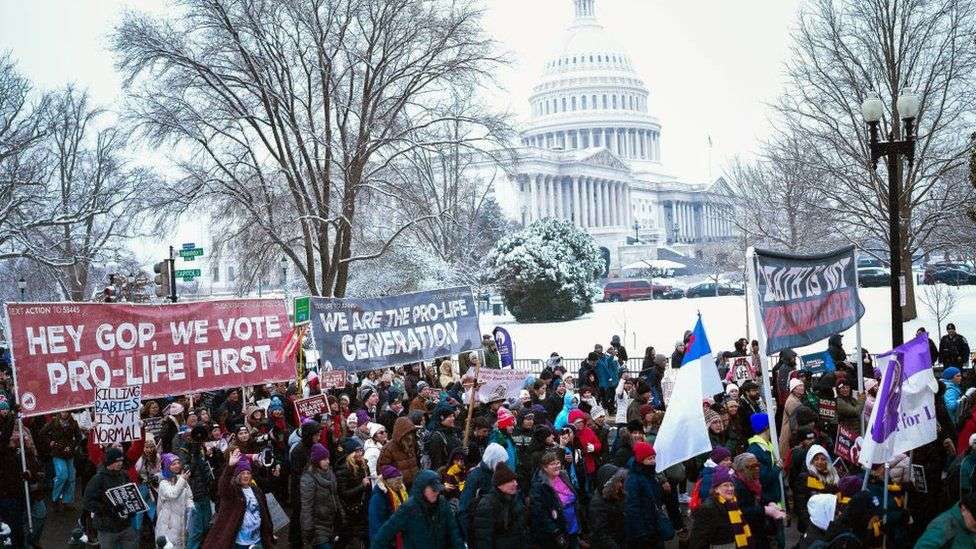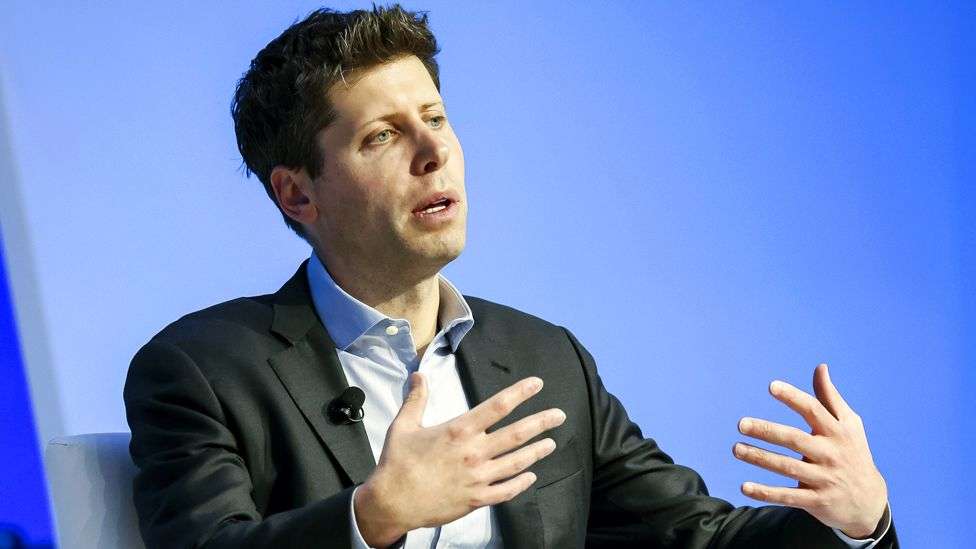On Friday, activists assembled in Washington for the March for Life, the nation's largest annual anti-abortion rally.
The crowds were thinner than in past years, due in part to the cold temperatures and blowing snow that blanketed the capital overnight.
But the campaigners in attendance this year also acknowledged the more concerning headwinds facing their movement, now in an election year: a general public broadly supportive of abortion rights, and a Republican party increasingly hesitant to join the fight.
"It is kind of discouraging," said Olivia Murphy, an activist from Virginia. "Keeping the momentum up is definitely challenging."
Four years earlier, Donald Trump had become the first and only sitting president to attend the March for Life. "Unborn children have never had a stronger defender in the White House," he said, pausing for applause.
Mr Trump soon delivered on that promise, helping to reshape the Supreme Court into the body that would overturn Roe v Wade in June 2022, rescinding the nationwide right to abortion. But in the 18 months since that generational victory in Dobbs v Jackson Women's Health Organization, things have not gone quite as planned.
Instead, the anti-abortion movement has been stymied by mounting public support for reproductive rights, and a series of bruising electoral defeats. These challenges will soon collide with the presidential election, where abortion is expected to be a leading issue. Mr Trump - the likely Republican nominee - has begun his own retreat, calling for "compromise" from activists.
"We want people in office to truly be on our side. It's a tough situation," Ms Murphy said. "But we'll work with what we have."
Last year, at the first march after Roe's demise, activists seemed triumphant.
In the immediate aftermath of Dobbs, Republican-controlled states moved swiftly to outlaw the procedure. Today, 21 states have either total or partial abortion bans on the books, with some including harsh punishments for doctors and others who assist in accessing the procedure, including jail time, steep fines, and the loss of medical licences.
But these anti-abortion policies incited fierce anger among broad sections of the American public, boosting support for reproductive rights. About 69% of voters think that abortion should be legal throughout the first three months of pregnancy - the period when most abortions occur - according to a recent Gallup poll. The survey marked a high watermark in support for pro-abortion activists.
And in the first year without Roe, the average number of monthly abortions rose, according to data released in October from a research group backed by the Society of Family Planning (SFP).
Abortion bans have caused serious harm to families across the country, said David Cohen, a law professor at Drexel University and an abortion expert. "But the anti-abortion movement would sure hope that they were accomplishing something more than some disruption."
"They thought they were - to use their words - 'saving babies' and, on balance, they're not," he said, citing the SFP data.
For Republican politicians, anti-abortion policies have proven politically toxic.
Reproductive rights have won every abortion-related ballot measure over the last two years, even in Republican-controlled states. And abortion is thought to have handed Democrats a series of unexpected electoral wins, including the 2022 midterms, the Virginia state elections and the Wisconsin Supreme Court.
"We're getting our butts kicked," said John Feehery, a Republican strategist. "The politics of this are not awesome for Republicans right now."
These results have spawned a growing unease among Republican lawmakers who fear the blowback of a strict anti-abortion stance.
In Congress, nearly three dozen House members who in 2021 signed a bill that recognised life at the moment of conception, have so far refused to sign on to nearly identical legislation crafted last year, a shift first reported by the New York Times. In the Senate, Republican Lindsey Graham's proposed anti-abortion legislation, a 20-week ban, was quickly shot down by members of his own party.
And Mr Trump, the overwhelming favourite to win the Republican presidential nomination, has done a partial about-face on the issue, dismissing the idea of a national ban - the ultimate goal for the anti-abortion movement - and calling for compromise.
"We're living in a time when there has to be a little bit of a concession one way or the other," he said in a televised Fox News Town Hall last week. "You have to win elections."
At Friday's march, several campaigners said they were disappointed and angered by Mr Trump's words, and the apparent lack of "moral courage" on the issue of abortion in the Republican party.
We are Catholic first, we are pro-life first, Joshua Feibelman told the OceanNewsUK. "To the degree that politics aligns with those values, that's how we determine our vote."
But just as many activists acknowledged that as the probable Republican nominee, Mr Trump would likely receive their vote anyway. These activists said they remained optimistic that if Mr Trump returned to the White House he would once again deliver for the anti-abortion cause.
"The pro-life generation knows when November 2024 comes around there's only going to be one option," said Kristan Hawkins, president of the influential anti-abortion group Students for Life.
"The thing about President Trump is that he's a man that prides himself on making his deals and keeping his deals," Ms Hawkins said. "He made a deal with the pro-life movement in 2016 and I'm holding him to that deal."








